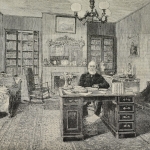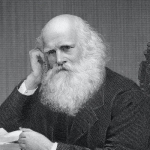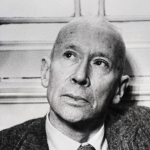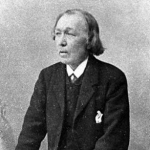from The Seasons: Winter by James Thomson

See, Winter comes to rule the varied year,
Sullen and sad, with all his rising train—
Vapours, and clouds, and storms. Be these my theme,
These, that exalt the soul to solemn thought
And heavenly musing. Welcome, kindred glooms!
Congenial horrors, hail! With frequent foot,
Pleas’d have I, in my cheerful morn of life,
When nurs’d by careless solitude I liv’d
And sung of Nature with unceasing joy,
Pleas’d have I wander’d through your rough domain;
Trod the pure virgin-snows, myself as pure;
Heard the winds roar, and the big torrent burst;
Or seen the deep-fermenting tempest brew’d
In the grim evening-sky. Thus pass’d the time,
Till through the lucid chambers of the south
Read Poem Sullen and sad, with all his rising train—
Vapours, and clouds, and storms. Be these my theme,
These, that exalt the soul to solemn thought
And heavenly musing. Welcome, kindred glooms!
Congenial horrors, hail! With frequent foot,
Pleas’d have I, in my cheerful morn of life,
When nurs’d by careless solitude I liv’d
And sung of Nature with unceasing joy,
Pleas’d have I wander’d through your rough domain;
Trod the pure virgin-snows, myself as pure;
Heard the winds roar, and the big torrent burst;
Or seen the deep-fermenting tempest brew’d
In the grim evening-sky. Thus pass’d the time,
Till through the lucid chambers of the south
0
Hymn to Life by James Schuyler

The wind rests its cheek upon the ground and feels the cool damp
And lifts its head with twigs and small dead blades of grass
Pressed into it as you might at the beach rise up and brush away
The sand. The day is cool and says, “I’m just staying overnight.”
The world is filled with music, and in between the music, silence
And varying the silence all sorts of sounds, natural and man made:
There goes a plane, some cars, geese that honk and, not here, but
Not so far away, a scream so rending that to hear it is to be
Read Poem And lifts its head with twigs and small dead blades of grass
Pressed into it as you might at the beach rise up and brush away
The sand. The day is cool and says, “I’m just staying overnight.”
The world is filled with music, and in between the music, silence
And varying the silence all sorts of sounds, natural and man made:
There goes a plane, some cars, geese that honk and, not here, but
Not so far away, a scream so rending that to hear it is to be
0
Snow-Bound: A Winter Idyl by John Greenleaf Whittier

To the Memory of the Household It Describes
This Poem is Dedicated by the Author
“As the Spirits of Darkness be stronger in the dark, so Good Spirits, which be Angels of Light, are augmented not only by the Divine light of the Sun, but also by our common Wood Fire: and as the Celestial Fire drives away dark spirits, so also this our Fire of Wood doth the same.” —Cor. Agrippa, Occult Philosophy, Book I.ch. v.
“Announced by all the trumpets of the sky,
Arrives the snow, and, driving o’er the fields,
Seems nowhere to alight: the whited air
Hides hills and woods, the river and the heaven,
And veils the farm-house at the garden’s end.
The sled and traveller stopped, the courier’s feet
Delayed, all friends shut out, the housemates sit
Around the radiant fireplace, enclosed
In a tumultuous privacy of Storm.”
EMERSON, The Snow Storm. The sun that brief December day
Rose cheerless over hills of gray,
And, darkly circled, gave at noon
A sadder light than waning moon.
Read Poem This Poem is Dedicated by the Author
“As the Spirits of Darkness be stronger in the dark, so Good Spirits, which be Angels of Light, are augmented not only by the Divine light of the Sun, but also by our common Wood Fire: and as the Celestial Fire drives away dark spirits, so also this our Fire of Wood doth the same.” —Cor. Agrippa, Occult Philosophy, Book I.ch. v.
“Announced by all the trumpets of the sky,
Arrives the snow, and, driving o’er the fields,
Seems nowhere to alight: the whited air
Hides hills and woods, the river and the heaven,
And veils the farm-house at the garden’s end.
The sled and traveller stopped, the courier’s feet
Delayed, all friends shut out, the housemates sit
Around the radiant fireplace, enclosed
In a tumultuous privacy of Storm.”
EMERSON, The Snow Storm. The sun that brief December day
Rose cheerless over hills of gray,
And, darkly circled, gave at noon
A sadder light than waning moon.
0
from Idylls of the King: The Passing of Arthur by Alfred, Lord Tennyson

That story which the bold Sir Bedivere,
First made and latest left of all the knights,
Told, when the man was no more than a voice
In the white winter of his age, to those
With whom he dwelt, new faces, other minds.
For on their march to westward, Bedivere,
Who slowly paced among the slumbering host,
Heard in his tent the moanings of the King:
"I found Him in the shining of the stars,
I mark'd Him in the flowering of His fields,
But in His ways with men I find Him not.
I waged His wars, and now I pass and die.
O me! for why is all around us here
Read Poem First made and latest left of all the knights,
Told, when the man was no more than a voice
In the white winter of his age, to those
With whom he dwelt, new faces, other minds.
For on their march to westward, Bedivere,
Who slowly paced among the slumbering host,
Heard in his tent the moanings of the King:
"I found Him in the shining of the stars,
I mark'd Him in the flowering of His fields,
But in His ways with men I find Him not.
I waged His wars, and now I pass and die.
O me! for why is all around us here
0
The Thrush by Edward Thomas

When Winter's ahead,
What can you read in November
That you read in April
When Winter's dead?
I hear the thrush, and I see
Him alone at the end of the lane
Near the bare poplar's tip,
Singing continuously.
Is it more that you know
Than that, even as in April,
So in November,
Winter is gone that must go?
Read Poem What can you read in November
That you read in April
When Winter's dead?
I hear the thrush, and I see
Him alone at the end of the lane
Near the bare poplar's tip,
Singing continuously.
Is it more that you know
Than that, even as in April,
So in November,
Winter is gone that must go?
0
The Waste Land by T. S. Eliot

‘Nam Sibyllam quidem Cumis ego ipse oculis meis vidi in ampulla pendere, et cum illi pueri dicerent:Σίβυλλα τίθέλεις; respondebat illa:άποθανεîνθέλω.’ For Ezra Pound
il miglior fabbro. I. The Burial of the Dead
Read Poem il miglior fabbro. I. The Burial of the Dead
0
from Light: Winter by Inger Christensen

Winter is out for a lot this year
the beach already is stiff
all will be one will be one this year
wings and ice will be one in the world
all will be changed in the world:
the boat will hear its steps on the ice
the war will hear its war on the ice
the woman will hear her hour on the ice
Read Poem the beach already is stiff
all will be one will be one this year
wings and ice will be one in the world
all will be changed in the world:
the boat will hear its steps on the ice
the war will hear its war on the ice
the woman will hear her hour on the ice
0
Counselors by Robert Fitzgerald

Whom should I consult? Philosophers
Are happy in their homes and seminars.
See this one with the mischievous bright childlike
Gaze going out through walls and air,
A tangent to the bent rays of the star.
Hear the chalk splutter, hear the groping voice:
Conceive the demiurge in his perpetual
Strife with the chaos of the universe,
Read Poem Are happy in their homes and seminars.
See this one with the mischievous bright childlike
Gaze going out through walls and air,
A tangent to the bent rays of the star.
Hear the chalk splutter, hear the groping voice:
Conceive the demiurge in his perpetual
Strife with the chaos of the universe,
0
An Immigrant Woman by Anne Winters

PART ONE
I
Slip-pilings on the Brooklyn littoral
—the poles still tarry, flimsy; the ferry terminus
with its walledup doors wan doorshapes
on eroded sills. Downstream, the strutwork
of the Williamsburg cable tower
threw its cool shadow half a mile inland
Read Poem I
Slip-pilings on the Brooklyn littoral
—the poles still tarry, flimsy; the ferry terminus
with its walledup doors wan doorshapes
on eroded sills. Downstream, the strutwork
of the Williamsburg cable tower
threw its cool shadow half a mile inland
0
Sonnets for Five Seasons by Anne Stevenson

(i.m. Charles Leslie Stevenson, 1909-79)
This House
Which represents you, as my bones do, waits,
all pores open, for the stun of snow. Which will come,
as it always does, between breaths, between nights
of no wind and days of the nulled sun.
And has to be welcome. All instinct wants to anticipate
faceless fields, a white road drawn
Read Poem This House
Which represents you, as my bones do, waits,
all pores open, for the stun of snow. Which will come,
as it always does, between breaths, between nights
of no wind and days of the nulled sun.
And has to be welcome. All instinct wants to anticipate
faceless fields, a white road drawn
0
March: An Ode by Algernon Charles Swinburne

I
Ere frost-flower and snow-blossom faded and fell, and the splendour of winter had passed out of sight,
The ways of the woodlands were fairer and stranger than dreams that fulfil us in sleep with delight;
The breath of the mouths of the winds had hardened on tree-tops and branches that glittered and swayed
Such wonders and glories of blossomlike snow or of frost that outlightens all flowers till it fade
That the sea was not lovelier than here was the land, nor the night than the day, nor the day than the night,
Nor the winter sublimer with storm than the spring: such mirth had the madness and might in thee made,
March, master of winds, bright minstrel and marshal of storms that enkindle the season they smite.
II
And now that the rage of thy rapture is satiate with revel and ravin and spoil of the snow,
And the branches it brightened are broken, and shattered the tree-tops that only thy wrath could lay low,
How should not thy lovers rejoice in thee, leader and lord of the year that exults to be born
So strong in thy strength and so glad of thy gladness whose laughter puts winter and sorrow to scorn?
Thou hast shaken the snows from thy wings, and the frost on thy forehead is molten: thy lips are aglow
Read Poem Ere frost-flower and snow-blossom faded and fell, and the splendour of winter had passed out of sight,
The ways of the woodlands were fairer and stranger than dreams that fulfil us in sleep with delight;
The breath of the mouths of the winds had hardened on tree-tops and branches that glittered and swayed
Such wonders and glories of blossomlike snow or of frost that outlightens all flowers till it fade
That the sea was not lovelier than here was the land, nor the night than the day, nor the day than the night,
Nor the winter sublimer with storm than the spring: such mirth had the madness and might in thee made,
March, master of winds, bright minstrel and marshal of storms that enkindle the season they smite.
II
And now that the rage of thy rapture is satiate with revel and ravin and spoil of the snow,
And the branches it brightened are broken, and shattered the tree-tops that only thy wrath could lay low,
How should not thy lovers rejoice in thee, leader and lord of the year that exults to be born
So strong in thy strength and so glad of thy gladness whose laughter puts winter and sorrow to scorn?
Thou hast shaken the snows from thy wings, and the frost on thy forehead is molten: thy lips are aglow
0
Morte d'Arthur by Alfred, Lord Tennyson

So all day long the noise of battle roll'd
Among the mountains by the winter sea;
Until King Arthur's table, man by man,
Had fallen in Lyonnesse about their Lord,
King Arthur: then, because his wound was deep,
The bold Sir Bedivere uplifted him,
Sir Bedivere, the last of all his knights,
And bore him to a chapel nigh the field,
A broken chancel with a broken cross,
That stood on a dark strait of barren land.
On one side lay the ocean, and on one
Lay a great water, and the moon was full.
Then spake King Arthur to Sir Bedivere:
"The sequel of to-day unsolders all
Read Poem Among the mountains by the winter sea;
Until King Arthur's table, man by man,
Had fallen in Lyonnesse about their Lord,
King Arthur: then, because his wound was deep,
The bold Sir Bedivere uplifted him,
Sir Bedivere, the last of all his knights,
And bore him to a chapel nigh the field,
A broken chancel with a broken cross,
That stood on a dark strait of barren land.
On one side lay the ocean, and on one
Lay a great water, and the moon was full.
Then spake King Arthur to Sir Bedivere:
"The sequel of to-day unsolders all
0
Said a Blade of Grass by Kahlil Gibran

Said a blade of grass to an autumn leaf, “You make such a noisefalling! You scatter all my winter dreams.”
Said the leaf indignant, “Low-born and low-dwelling! Songless,peevish thing! You live not in the upper air and you cannot tellthe sound of singing.”
Then the autumn leaf lay down upon the earth and slept. And whenspring came she waked again—and she was a blade of grass.
And when it was autumn and her winter sleep was upon her, andabove her through all the air the leaves were falling, she mutteredto herself, “O these autumn leaves! They make such noise! Theyscatter all my winter dreams.”
Read Poem Said the leaf indignant, “Low-born and low-dwelling! Songless,peevish thing! You live not in the upper air and you cannot tellthe sound of singing.”
Then the autumn leaf lay down upon the earth and slept. And whenspring came she waked again—and she was a blade of grass.
And when it was autumn and her winter sleep was upon her, andabove her through all the air the leaves were falling, she mutteredto herself, “O these autumn leaves! They make such noise! Theyscatter all my winter dreams.”
0
A Winter Piece by William Cullen Bryant

The time has been that these wild solitudes,
Yet beautiful as wild, were trod by me
Oftener than now; and when the ills of life
Had chafed my spirit—when the unsteady pulse
Beat with strange flutterings—I would wander forth
And seek the woods. The sunshine on my path
Was to me a friend. The swelling hills,
The quiet dells retiring far between,
With gentle invitation to explore
Their windings, were a calm society
That talked with me and soothed me. Then the chant
Of birds, and chime of brooks, and soft caress
Of the fresh sylvan air, made me forget
The thoughts that broke my peace, and I began
0
Midwinter by John Unterecker

At dusk, a great flare of winter lightning photographed the bay:
Waves were broken scrolls. Beyond Donegal, white mountains
hung in a narrow bas-relief frozen on sky.
Later, there was sleet: trees down
on the Drumholm road; near Timoney’s farm, a frantic goose
pinned under branches.
All night long, we spoke of loneliness,
long winter, while winter sang in the chimneys.
Read Poem Waves were broken scrolls. Beyond Donegal, white mountains
hung in a narrow bas-relief frozen on sky.
Later, there was sleet: trees down
on the Drumholm road; near Timoney’s farm, a frantic goose
pinned under branches.
All night long, we spoke of loneliness,
long winter, while winter sang in the chimneys.
0
The Pipe by Stéphane Mallarmé

Yesterday I found my pipe while pondering a long evening of work, of fine winter work. Thrown aside were my cigarettes, with all the childish joys of summer, into the past which the leaves shining blue in the sun, the muslins, illuminate, and taken up once again was the grave pipe of a serious man who wants to smoke for a long while without being disturbed, so as better to work: but I was not prepared for the surprise that this abandoned object had in store for me; for hardly had I drawn the first puff when I forgot the grand books I was planning to write, and, amazed, moved to a feeling of tenderness, I breathed in the air of the previous winter which was now coming back to me. I had not been in contact with my faithful sweetheart since returning to France, and now all of London, London as I had lived it a year ago entirely alone, appeared before my eyes: first the dear fogs that muffle one’s brains and have an odor of their own there when they penetrate beneath the casements. My tobacco had the scent of a somber room with leather furniture sprinkled by coal dust, on which the thin black cat would curl and stretch; the big fires! and the maid with red arms pouring coals, and the noise of those coals falling from the sheet-iron bucket into the iron scuttle in the morning—when the postman gave the solemn double knock that kept me alive! Once again I saw through the windows those sickly trees of the deserted square—I saw the open sea, crossed so often that winter, shivering on the deck of the steamer wet with drizzle and blackened from the fumes—with my poor wandering beloved, decked out in traveller’s clothes, a long dress, dull as the dust of the roads, a coat clinging damply to her cold shoulders, one of those straw hats with no feather and hardly any ribbons that wealthy ladies throw away upon arrival, mangled as they are by the sea, and that poor loved ones refurbish for many another season. Around her neck was wound the terrible handkerchief that one waves when saying goodbye forever.
Read Poem 0
Kaddish by Allen Ginsberg

For Naomi Ginsberg, 1894—1956 I
Strange now to think of you, gone without corsets & eyes, while I walk on the sunny pavement of Greenwich Village.
Read Poem Strange now to think of you, gone without corsets & eyes, while I walk on the sunny pavement of Greenwich Village.
0
anyone lived in a pretty how town by E. E. Cummings

anyone lived in a pretty how town
(with up so floating many bells down)
spring summer autumn winter
he sang his didn’t he danced his did.
Women and men(both little and small)
cared for anyone not at all
they sowed their isn’t they reaped their same
sun moon stars rain
Read Poem (with up so floating many bells down)
spring summer autumn winter
he sang his didn’t he danced his did.
Women and men(both little and small)
cared for anyone not at all
they sowed their isn’t they reaped their same
sun moon stars rain
0
Greenland’s Icy Mountains by Knight of the White Elephant of Burmah William McGonagall

Greenland’s icy mountains are fascinating and grand,
And wondrously created by the Almighty’s command;
And the works of the Almighty there’s few can understand:
Who knows but it might be a part of Fairyland?
Because there are churches of ice, and houses glittering like glass,
And for scenic grandeur there’s nothing can it surpass,
Besides there’s monuments and spires, also ruins,
Read Poem And wondrously created by the Almighty’s command;
And the works of the Almighty there’s few can understand:
Who knows but it might be a part of Fairyland?
Because there are churches of ice, and houses glittering like glass,
And for scenic grandeur there’s nothing can it surpass,
Besides there’s monuments and spires, also ruins,
0
Passages from Virgil’s First Georgic by Robert Fitzgerald

I. Until Jove let it be, no colonist
Mastered the wild earth; no land was marked,
None parceled out or shared; but everyone
Looked for his living in the common world.
And Jove gave poison to the blacksnakes, and
Made the wolves ravage, made the ocean roll,
Knocked honey from the leaves, took fire away—
So man might beat out various inventions
Read Poem Mastered the wild earth; no land was marked,
None parceled out or shared; but everyone
Looked for his living in the common world.
And Jove gave poison to the blacksnakes, and
Made the wolves ravage, made the ocean roll,
Knocked honey from the leaves, took fire away—
So man might beat out various inventions
0